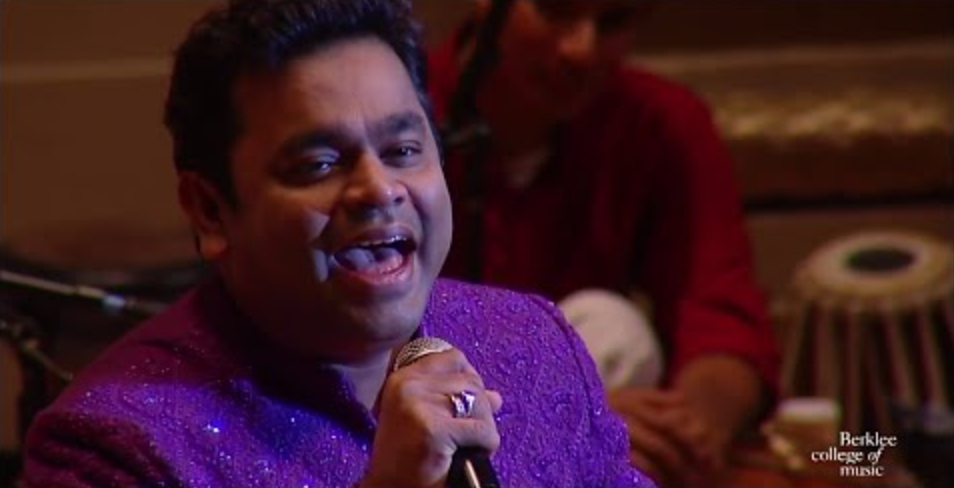
Oscar-winner, Indian composer, singer and songwriter, A. R. Rahman will be live in concert at the Prudential Center on Friday, August 12.
Described as the world’s most prominent and prolific film composer by TIME Magazine, A.R. Rahman is notable for integrating Eastern classical music with electronic music sounds, world music genres and traditional orchestral arrangements. Rahman has won two Academy Awards, two Grammy Awards, a BAFTA Award, a Golden Globe, four National Film Awards, 15 Filmfare Awards and 13 Filmfare Awards South, in addition to numerous other awards and nominations. In 2009, TIME Magazine placed Rahman on its list of the World’s Most Influential People.
About A.R. Rahman
A.R. Rahman has won 17 Filmfare awards (the Indian equivalent of the Oscars), 3 MTV awards, 4 IIFA Awards, 6 TamilNadu State awards, six Zee awards, four Screen Awards and more. He has also been given the prestigious Padmashree (the highest civilian honour in India) award by the Government of India in the year 2000 for outstanding contributions to the Indian film industry. Rahman is widely considered the man who single-handedly revived public interest in Indian film music. In 1991, noted filmmaker Mani Ratnam offered Rahman a movie Roja which was a run-away success and brought nationwide fame and acclaim to the composer. Rahman followed up Roja with Gentleman, Thiruda Thiruda, Kaadhalan, Bombay and Minssara Kannavu all of which were huge chartbusters and were dubbed in Hindi as well. Other hits in Tamil include Alaipayuthey, Kandukondein Kandukondein, Jeans, Mudalvan, Kannathil Muthamittal, Boys etc.
His foray into Hindi movies started off with a big bang in the superhit Rangeela followed by Dil Se, Taal, 1947/Earth, Pukar, Lagaan, Zubeida, Meenaxi, The Legend of Bhagat Singh, Yuva, Tehzeeb amongst others all of which had huge album sales. His more recent releases include Swades, Ah-Aah, Bose: The Forgotten Hero, The Rising, Water and Rang De Basanti all of which have been critically acclaimed and well received. In 2001, Andrew Lloyd Webber, the well-known composer of musicals like Phantom of the Opera, Cats, Jesus Christ Superstar, invited Rahman to compose for the musical, Bombay Dreams, which opened to packed houses in London’s West End. The show had an unprecedented run for two years and later premiered on New York’s Broadway.
[Read Related: ‘Dil Se’ Turns 20 Years Old: We Celebrate Bollywood’s Tragic Love Stories]
Rahman is also involved in other charitable causes. In 2004, he was appointed as the Global Ambassador of the Stop T B Partnership, a project by the World Health Organization (WHO). He also supports charities like Save the Children, India and as a producer on the single ‘We can make it better’ by Don Asian alongside Mukhtar Sahota, A.R. Rahman showed his charitable side again with all proceeds going to the Tsunami victims, as did his 2004 Tsunami relief concert in India.
A.R. Rahman’s 2022 concert tour will feature songs in Hindi, Tamil, Telugu and English.
Reserve Tickets now at Ticketmaster.com Tickets can also be purchased in person by visiting the Prudential Center Box Office located at 25 Lafayette Street in Newark, N.J.
Photo Source: Screenshot/Berklee College of Music
About Prudential Center:
Prudential Center is a world-class sport and entertainment venue located in downtown Newark, New Jersey. Opened in October 2007, the state-of-the-art arena is the home of the National Hockey League’s (NHL) three-time Stanley Cup Champion New Jersey Devils, Seton Hall University’s NCAA Division I Men’s Basketball program, and more than 175 concerts, family shows and special events each year. The arena is also home to the GRAMMY Museum Experience Prudential Center, which opened its doors to the public in October 2017. The 8,200-square-foot experience marks the first GRAMMY Museum outpost on the East Coast and features a dynamic combination of educational programming and interactive permanent and traveling exhibits, including a spotlight on legendary GRAMMY winners from New Jersey.
Ranked in the Top 8 nationally by Pollstar, Billboard and Venues Today, Prudential Center is recognized as one of the premier venues in the United States, and more than 2 million guests annually. For more information about Prudential Center, visit PruCenter.com and follow the arena on Facebook, Twitter and Instagram @PruCenter. Prudential Center is a Harris Blitzer Sports & Entertainment property.




